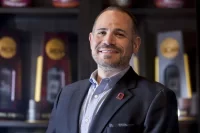
Joe Pelliccia, associate professor of biology, likes teaching all students, great and small
Bates students working closely with Pelliccia and model organism C. elegans have learned how the small soil nematode worms regulate the movement of transposable genetic elements — what Pelliccia calls “jumping genes” — in their DNA.
To demonstrate how alcohol impairs gross motor skills, Pelliccia recently had 34 fifth- and sixth-graders from Lewiston’s Longley Elementary School measure how quickly salt-water mussels absorbed food marked with red dye. Then the students — at Bates as part of a Service-Learning project — introduced alcohol into the seawater. Bombed out of their bivalves, the mussels ate much slower.
“It was a gas working with these kids,” Pelliccia said. Teaching grade schoolers is “big-time different,” but he said that the alcohol and mussel experiment is the same one he gives to first- and second-year biology majors at Bates. “The benefit to the local school kids is dramatic. Many of them had never been on campus except for a sporting event.”
Back at Bates after two years of working at the National Science Foundation’s (NSF) Division of Undergraduate Education, Pelliccia recently helped developed a grant proposal that resulted in a $1.3 million award from the Howard Hughes Medical Institute for science education at Bates. Working with colleagues in the departments of physics, biology and education, he also co-developed the Bates Science Education Scholars program to increase the number of Bates students who graduate certified for public school teaching.




